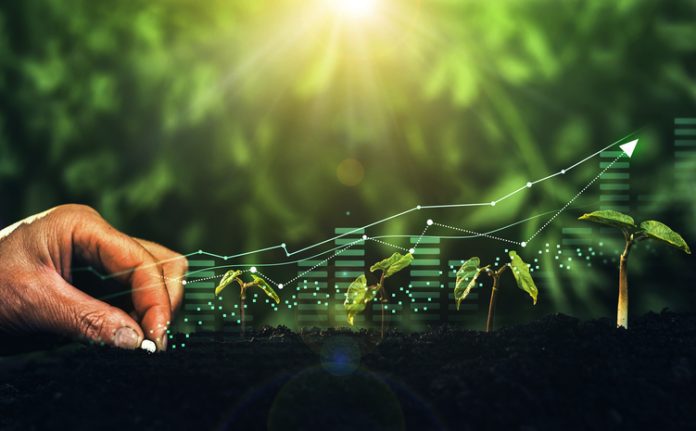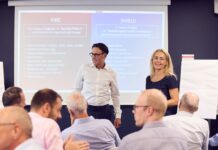By Diana Verde Nieto and Penny Brook
We are standing at the foothills of a new business paradigm; we are starring into a near future where the convergence of innovation (double click AI) and Sustainability will prove itself to drive sustainable economic growth.
Let’s start with Luxury – it’s a great case study. Despite its reputation for being stagnant, the Luxury industry has consistently grown over the past 40 years and is quietly innovative. Luxury brands are often deeply rooted in history which helps define their distinct story and credibility but that is only one lever. Craft, quality, image, social and nature positive outcomes must also be at play in today’s world so consumers of tomorrow continue to desire Luxury and be willing to invest.
When we talk about innovation, we don’t mean unconventional ideas with limited scalability and low economic returns. Instead, we’re referring to transforming fresh concepts into tangible value across different areas such as goods, services, experiences, business models, or approaches.
Here’s a great luxury example; Like LVMH, their parent company, Parfums Christian Dior recognizes the intersection of luxury, creativity, and nature. Over 80% of the ingredients used in their products are sourced from natural origins. Flowers are integral to their products, but they face a higher risk of extinction compared to other species.
In terms of biodiversity, they are transitioning their gardens around the world to organic and/or regenerative flower farming. Currently, 70% of these gardens adopt organic practices. Their goal is to go beyond organic methods and embrace regenerative practices that restore carbon levels in the soil, enhance biodiversity, and increase resilience. They are proud members of UEBT, an organization promoting responsible sourcing. By 2026, they aim to have all their gardens certified by UEBT.
The Dior team are committed to upskilling their workforce to integrate Sustainability into their work. They believe that everyone can contribute to a Sustainable future. This is the essence of the Reimagining Way.
The process of Reimagining goes beyond ideation and creativity; it requires practical implementation steps, behavioural change and most importantly collaboration. Historically Competition Law has rendered it almost impossible to collaborate across sector. With anti-trust rules being rewritten, now is an ideal time for collaboration.
Innovation builds upon previous advancements to boost productivity and foster economic growth. Innovative companies have demonstrated their ability to impact businesses and society on a larger scale. As Sustainability becomes increasingly important, the ability to reimagine will become a key differentiator that gives companies a competitive edge.
Another great example is Spout Ventures f they have launched a countertop atmospheric water generator that can produce up to 2.5 gallons of water daily. The device, extracts potable water from the humidity in the air, making it suitable for use in humid climates. The founder, Reuben Vollmer, was inspired to develop this technology after his parents’ olive farm faced water scarcity during California’s drought. The device condenses, filters, and alkalizes the water, with a UV light preventing bacterial growth. The company is now working on solutions for water access issues in agriculture and the hospitality industry as water is a blind spot for all industries.
These types of innovations are game changers, and the good news is that they are multiple. Looking ahead there has been much discussion about changing systems on a massive scale. However, the question remains: which system will be changed and who will take responsibility for making it happen?
As we approach the end of the first quarter of 2024, economic growth poses significant challenges for some industries. To achieve their Sustainability goals whilst maintaining a healthy bottom line, companies need innovation to occur faster and on a larger scale.
How can this be achieved? An essential step in our ability to reimagine is to hack the system. Hacking systems requires small capital expenditure, it helps businesses adapt and transform by optimizing efficiencies and Sustainability practices. ‘Successful ‘Business practice is often associated with rigid processes aimed at extracting financial value in the short term from nature or human labour. We believe the solution to inefficiencies, lack of insight, stagnation, or obsolescence may lie in challenging conventional norms within the industry.
Technological advancements and the expertise of entrepreneurs, scientists, and innovators can play a proactive role in decision-making processes at all levels. Identifying problem areas and seeking easy, free, or low-cost solutions, is how businesses can streamline processes and enhance efficiency, benefiting everyone whilst enhancing their societal and nature positive outcomes. Collaboration presents a significant opportunity for businesses. It not only achieves quicker outcomes but also lowers costs.
The ultimate opportunity is to break free of the business-as-usual norms; to reimagine your business’s economic growth by creating Sustainable innovations and integrating them into existing systems on a large scale. To achieve this, holistic and creative strategies that address social, economic, and environmental aspects are essential. Are you ready to reimagine your business?
About the Authors
 Diana Verde Nieto is an entrepreneur, author and prominent business leader. Diana has a remarkable track record of over 20 years of experience in guiding companies towards sustainable economic growth and innovation. She established one of the world’s pioneering sustainability communication consultancies in 2002, which she exited in 2010. In 2011, she co-founded Positive Luxury and spearheaded the enterprise until 2022, continuing to sit on the board. Diana serves as an advisor Sustainnovate, The British Beauty Council, La Praire and The United Nations Department of Economic and Social Affair. Diana has recently released a book- Reimagining Luxury: How to Build a Sustainable Future for Your Brand.
Diana Verde Nieto is an entrepreneur, author and prominent business leader. Diana has a remarkable track record of over 20 years of experience in guiding companies towards sustainable economic growth and innovation. She established one of the world’s pioneering sustainability communication consultancies in 2002, which she exited in 2010. In 2011, she co-founded Positive Luxury and spearheaded the enterprise until 2022, continuing to sit on the board. Diana serves as an advisor Sustainnovate, The British Beauty Council, La Praire and The United Nations Department of Economic and Social Affair. Diana has recently released a book- Reimagining Luxury: How to Build a Sustainable Future for Your Brand.
 Penny Brook is a mission-driven Marketing, Experience and C-Suite business leader, in her 25+ year career Penny has spanned globally admired brands such as Clarks Shoes, Philips Electronics and Mulberry. Her current role as CEO and Founding Reimaginer at Sustainnovate, marks a new more expansive mission partnering directly with brands and sector coalitions to support their sustainable economic growth. As a Founding Reimaginer she is part of a movement that demonstrates the potential of a new business paradigm at the intersection of positive nature, societal and profitable business outcomes.
Penny Brook is a mission-driven Marketing, Experience and C-Suite business leader, in her 25+ year career Penny has spanned globally admired brands such as Clarks Shoes, Philips Electronics and Mulberry. Her current role as CEO and Founding Reimaginer at Sustainnovate, marks a new more expansive mission partnering directly with brands and sector coalitions to support their sustainable economic growth. As a Founding Reimaginer she is part of a movement that demonstrates the potential of a new business paradigm at the intersection of positive nature, societal and profitable business outcomes.








![Deconstructing the Myth of Entrepreneurship iStock-2151090098 [Converted]](https://www.europeanbusinessreview.com/wp-content/uploads/2024/09/iStock-2151090098-Converted-218x150.png)


























